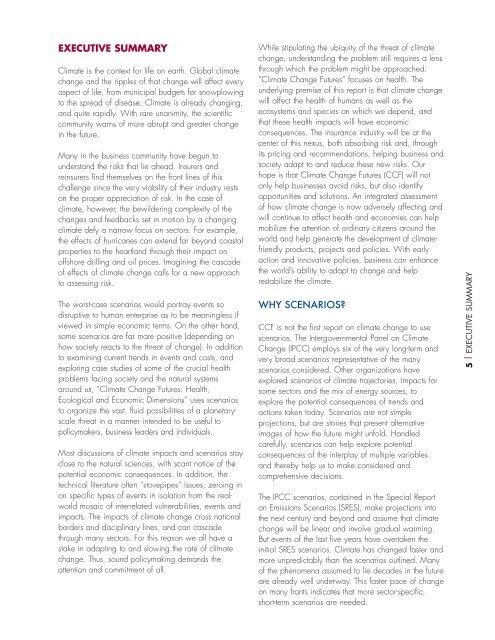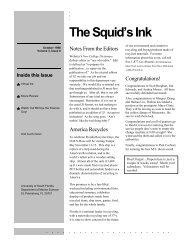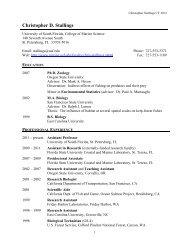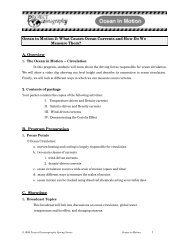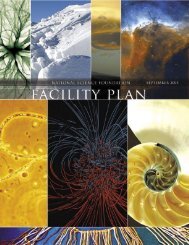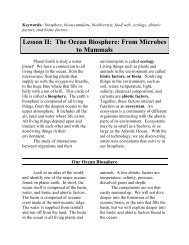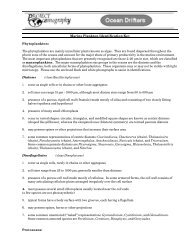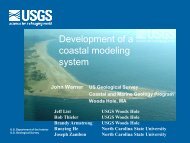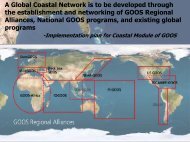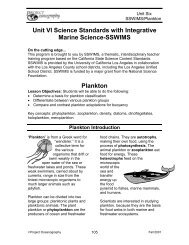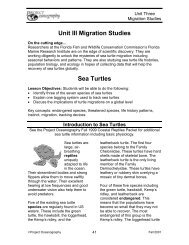Climate change futures: health, ecological and economic dimensions
Climate change futures: health, ecological and economic dimensions
Climate change futures: health, ecological and economic dimensions
You also want an ePaper? Increase the reach of your titles
YUMPU automatically turns print PDFs into web optimized ePapers that Google loves.
EXECUTIVE SUMMARY<br />
<strong>Climate</strong> is the context for life on earth. Global climate<br />
<strong>change</strong> <strong>and</strong> the ripples of that <strong>change</strong> will affect every<br />
aspect of life, from municipal budgets for snowplowing<br />
to the spread of disease. <strong>Climate</strong> is already changing,<br />
<strong>and</strong> quite rapidly. With rare unanimity, the scientific<br />
community warns of more abrupt <strong>and</strong> greater <strong>change</strong><br />
in the future.<br />
Many in the business community have begun to<br />
underst<strong>and</strong> the risks that lie ahead. Insurers <strong>and</strong><br />
reinsurers find themselves on the front lines of this<br />
challenge since the very viability of their industry rests<br />
on the proper appreciation of risk. In the case of<br />
climate, however, the bewildering complexity of the<br />
<strong>change</strong>s <strong>and</strong> feedbacks set in motion by a changing<br />
climate defy a narrow focus on sectors. For example,<br />
the effects of hurricanes can extend far beyond coastal<br />
properties to the heartl<strong>and</strong> through their impact on<br />
offshore drilling <strong>and</strong> oil prices. Imagining the cascade<br />
of effects of climate <strong>change</strong> calls for a new approach<br />
to assessing risk.<br />
The worst-case scenarios would portray events so<br />
disruptive to human enterprise as to be meaningless if<br />
viewed in simple <strong>economic</strong> terms. On the other h<strong>and</strong>,<br />
some scenarios are far more positive (depending on<br />
how society reacts to the threat of <strong>change</strong>). In addition<br />
to examining current trends in events <strong>and</strong> costs, <strong>and</strong><br />
exploring case studies of some of the crucial <strong>health</strong><br />
problems facing society <strong>and</strong> the natural systems<br />
around us, “<strong>Climate</strong> Change Futures: Health,<br />
Ecological <strong>and</strong> Economic Dimensions” uses scenarios<br />
to organize the vast, fluid possibilities of a planetaryscale<br />
threat in a manner intended to be useful to<br />
policymakers, business leaders <strong>and</strong> individuals.<br />
Most discussions of climate impacts <strong>and</strong> scenarios stay<br />
close to the natural sciences, with scant notice of the<br />
potential <strong>economic</strong> consequences. In addition, the<br />
technical literature often “stovepipes” issues, zeroing in<br />
on specific types of events in isolation from the realworld<br />
mosaic of interrelated vulnerabilities, events <strong>and</strong><br />
impacts. The impacts of climate <strong>change</strong> cross national<br />
borders <strong>and</strong> disciplinary lines, <strong>and</strong> can cascade<br />
through many sectors. For this reason we all have a<br />
stake in adapting to <strong>and</strong> slowing the rate of climate<br />
<strong>change</strong>. Thus, sound policymaking dem<strong>and</strong>s the<br />
attention <strong>and</strong> commitment of all.<br />
While stipulating the ubiquity of the threat of climate<br />
<strong>change</strong>, underst<strong>and</strong>ing the problem still requires a lens<br />
through which the problem might be approached.<br />
“<strong>Climate</strong> Change Futures” focuses on <strong>health</strong>. The<br />
underlying premise of this report is that climate <strong>change</strong><br />
will affect the <strong>health</strong> of humans as well as the<br />
ecosystems <strong>and</strong> species on which we depend, <strong>and</strong><br />
that these <strong>health</strong> impacts will have <strong>economic</strong><br />
consequences. The insurance industry will be at the<br />
center of this nexus, both absorbing risk <strong>and</strong>, through<br />
its pricing <strong>and</strong> recommendations, helping business <strong>and</strong><br />
society adapt to <strong>and</strong> reduce these new risks. Our<br />
hope is that <strong>Climate</strong> Change Futures (CCF) will not<br />
only help businesses avoid risks, but also identify<br />
opportunities <strong>and</strong> solutions. An integrated assessment<br />
of how climate <strong>change</strong> is now adversely affecting <strong>and</strong><br />
will continue to affect <strong>health</strong> <strong>and</strong> economies can help<br />
mobilize the attention of ordinary citizens around the<br />
world <strong>and</strong> help generate the development of climatefriendly<br />
products, projects <strong>and</strong> policies. With early<br />
action <strong>and</strong> innovative policies, business can enhance<br />
the world’s ability to adapt to <strong>change</strong> <strong>and</strong> help<br />
restabilize the climate.<br />
WHY SCENARIOS?<br />
CCF is not the first report on climate <strong>change</strong> to use<br />
scenarios. The Intergovernmental Panel on <strong>Climate</strong><br />
Change (IPCC) employs six of the very long-term <strong>and</strong><br />
very broad scenarios representative of the many<br />
scenarios considered. Other organizations have<br />
explored scenarios of climate trajectories, impacts for<br />
some sectors <strong>and</strong> the mix of energy sources, to<br />
explore the potential consequences of trends <strong>and</strong><br />
actions taken today. Scenarios are not simple<br />
projections, but are stories that present alternative<br />
images of how the future might unfold. H<strong>and</strong>led<br />
carefully, scenarios can help explore potential<br />
consequences of the interplay of multiple variables<br />
<strong>and</strong> thereby help us to make considered <strong>and</strong><br />
comprehensive decisions.<br />
The IPCC scenarios, contained in the Special Report<br />
on Emissions Scenarios (SRES), make projections into<br />
the next century <strong>and</strong> beyond <strong>and</strong> assume that climate<br />
<strong>change</strong> will be linear <strong>and</strong> involve gradual warming.<br />
But events of the last five years have overtaken the<br />
initial SRES scenarios. <strong>Climate</strong> has <strong>change</strong>d faster <strong>and</strong><br />
more unpredictably than the scenarios outlined. Many<br />
of the phenomena assumed to lie decades in the future<br />
are already well underway. This faster pace of <strong>change</strong><br />
on many fronts indicates that more sector-specific,<br />
short-term scenarios are needed.<br />
5 | EXECUTIVE SUMMARY


